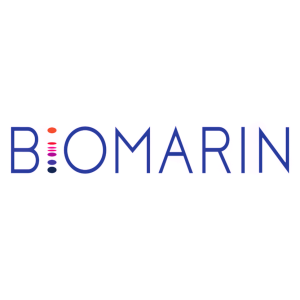U.S. Food and Drug Administration Approves BioMarin's BRINEURA® (cerliponase alfa) for Children Under 3 Years with CLN2 Disease
Rhea-AI Summary
The FDA has approved BioMarin's supplemental Biologics License Application (sBLA) for BRINEURA® (cerliponase alfa) to treat children of all ages with neuronal ceroid lipofuscinosis type 2 (CLN2 disease), including those under 3 years, regardless of symptom presence. Previously, BRINEURA was only indicated for symptomatic children aged 3 and above. The approval is based on data from Study 190-203, a Phase 2 trial that showed BRINEURA slows motor function decline and delays disease onset in children aged 1-6, including those under 3. In this study, none of the treated children under 3 experienced a significant motor decline, compared to 61% of untreated children in a natural history cohort. The safety profile for children under 3 is consistent with the known safety profile of the drug. This expanded indication emphasizes the importance of early diagnosis and treatment for CLN2 disease.
Positive
- FDA approval of BRINEURA for children under 3 with CLN2 disease.
- Study 190-203 showed BRINEURA slows motor function decline in children aged 1-6.
- None of the treated children under 3 had a two-point decline in motor function.
- BRINEURA’s safety profile for children under 3 is consistent with known data.
- Expanded indication may lead to earlier diagnosis and treatment initiation.
Negative
- None.
Insights
This FDA approval for BRINEURA® (cerliponase alfa) marks a significant advancement in treating CLN2 Batten disease. The expanded indication now allows for treatment in children of all ages, including those who are presymptomatic. This is a game-changer in managing this rare, rapidly progressing neurodegenerative disorder.
Key points to consider:
- Early intervention potential: The ability to treat presymptomatic children could significantly alter the disease course, potentially delaying or mitigating severe symptoms.
- Efficacy data: In Study 190-203, none of the children under 3 years treated with BRINEURA experienced a two-point decline in motor function by the final assessment at week 169. This is in stark contrast to
61% of untreated children in the natural history cohort who did experience such decline. - Safety profile: The safety results in children under 3 were consistent with the known profile, which is important for expanding use to younger patients.
- Market impact: This approval could drive increased adoption of BRINEURA, potentially expanding BioMarin's market share in the rare disease space.
However, investors should note that while this approval is promising, the ultra-rare nature of CLN2 disease means the patient population remains small. The real value lies in BioMarin's strengthened position in the orphan drug market and the potential for this approach to be applied to other rare pediatric conditions.
This FDA approval for BRINEURA® represents a significant milestone for BioMarin, potentially impacting its financial outlook. Here's what investors should consider:
- Market expansion: The broadened indication to include all ages and presymptomatic children could substantially increase BRINEURA's addressable market.
- Revenue growth: While CLN2 is an ultra-rare disease, earlier treatment initiation could lead to longer treatment durations per patient, potentially boosting per-patient revenue.
- Pricing considerations: Given the expanded use in younger patients, there may be increased scrutiny on BRINEURA's pricing, which investors should monitor.
- Competitive advantage: This approval strengthens BioMarin's position in the rare disease market, particularly in neurological conditions, which could have positive implications for its broader portfolio and pipeline.
- Reimbursement landscape: The approval for presymptomatic use may necessitate updates to reimbursement policies, which could impact adoption rates.
While specific financial projections would require more data, this approval is likely to be viewed positively by the market. It reinforces BioMarin's expertise in rare diseases and its ability to expand indications for existing products, a strategy that can be more cost-effective than developing entirely new drugs. Investors should watch for updates on BRINEURA's sales in upcoming quarterly reports to gauge the impact of this expanded indication.
Now Approved for Children of All Ages with CLN2 Batten Disease, Regardless of Whether They Yet Show Symptoms
"Today's approval represents a significant step forward in enabling children to be treated with BRINEURA as early as possible, when we can have the greatest impact in altering the natural course of disease," said Hank Fuchs, M.D., president of Worldwide Research and Development at BioMarin. "We know that every day counts for families affected by serious genetic conditions such as CLN2 disease, which is characterized by a rapid onset of neurodegenerative symptoms. We have been working diligently since BRINEURA's initial approval to support this expanded use in children of all ages, even before they begin to show symptoms."
The sBLA is supported by data from Study 190-203, a Phase 2, open-label, multicenter trial evaluating BRINEURA treatment over the span of approximately three years in children aged 1-6 years at baseline, including eight children less than 3 years of age. Results from Study 190-203, which were presented at the 20th Annual We're Organizing Research on Lysosomal Diseases meeting (WORLDSymposium) in February, showed that intraventricular (intracerebroventricular, ICV)-administered BRINEURA slowed the decline in motor function and delayed disease onset in children with CLN2 disease, including those who were under 3 years of age. BRINEURA's safety profile has been well-characterized, and safety results in children under 3 years of age were similar to the known safety profile of the medicine. In addition to confirming that treatment initiated after 3 years of age significantly slows the progression of CLN2 disease, these are the first data to demonstrate that early treatment initiation before 3 years of age may result in delaying disease onset.
In Study 190-203, children were assessed for decline in the motor domain of the CLN2 Clinical Rating Scale. This domain measures ambulation, with normal function being a score of three and no function being a score of zero. Decline was defined as having a sustained two-point loss or an unreversed score of zero. In the children below 3 years of age treated with BRINEURA in the trial, none (
"Receiving a CLN2 diagnosis is devastating for families as the disease is life-limiting and can severely impact a child's daily functioning and quality of life from a very young age, with symptoms including seizures, speech and language deficits, impaired movement and vision loss," said Ineka Whiteman, Ph.D., head of Research and Medical Affairs at the Batten Disease Support, Research, & Advocacy (BDSRA) Foundation. "The opportunity to start BRINEURA treatment earlier, even before the onset of symptoms, provides newfound hope for the families impacted by this rapidly progressive disease. Importantly, this expanded indication provides further impetus for early diagnosis of CLN2 disease, as we continue advocating for inclusion of CLN2 disease on the RUSP (Recommended Uniform Screening Panel) for newborn screening."
About CLN2 Disease
Children with neuronal ceroid lipofuscinosis type 2 (CLN2 disease), also known as tripeptidyl peptidase 1 (TPP1) deficiency, typically begin experiencing seizures between the ages of 2 and 4 years old, preceded in the majority of cases by language development delay. The disease progresses rapidly with most affected children losing the ability to walk and talk by approximately 6 years of age. Initial symptoms are followed by movement disorders, motor deterioration, dementia, blindness, and death usually occurring between the ages of 8 and 12 years of age. During the later stages of the disease, feeding and tending to everyday needs become very difficult. BioMarin estimates the incidence of CLN2 disease is approximately one in 200,000, with up to 1,200 to 1,600 children in the regions of the world where BioMarin operates, many of whom are undiagnosed.
The neuronal ceroid lipofuscinoses (NCLs) are a heterogeneous group of lysosomal storage disorders that includes the autosomal recessive neurodegenerative disorder CLN2 disease. CLN2 disease is caused by mutations in the TPP1 gene resulting in deficient activity of the enzyme TPP1. In the absence of TPP1, lysosomal storage materials normally metabolized by this enzyme accumulate in many organs, particularly in the brain and retina. Buildup of these storage materials in the cells of the nervous system contributes to the progressive and relentless neurodegeneration, which manifests as loss of cognitive, motor and visual functions.
About BRINEURA
BRINEURA is an enzyme replacement therapy indicated to slow the loss of the ability to walk or crawl (ambulation) in pediatric patients with neuronal ceroid lipofuscinosis type 2 (CLN2 disease), also known as tripeptidyl peptidase 1 (TPP1) deficiency, a form of Batten disease.
BRINEURA is a recombinant form of human TPP1, the enzyme deficient in children with CLN2 disease, designed to restore TPP1 enzyme activity and break down the storage materials that cause CLN2 disease. To reach the cells of the brain and central nervous system, the treatment is delivered directly into the fluid surrounding the brain (cerebrospinal fluid) using BioMarin's patented technology.
BRINEURA, the first and only approved treatment for children with CLN2 disease, was initially approved in 2017 by the
Patient Support Accessing BRINEURA
To reach a BioMarin RareConnections® Case Manager, please call, toll-free, 1-866-906-6100 or e-mail support@biomarin-rareconnections.com. For more information about BRINEURA, please visit www.brineura.com. For additional information regarding this product, please contact BioMarin Medical Information at medinfo@bmrn.com.
BRINEURA
BRINEURA (cerliponase alfa) is a prescription medication used to slow the loss of ability to walk or crawl (ambulation) in pediatric patients with neuronal ceroid lipofuscinosis type 2 (CLN2 disease), also known as tripeptidyl peptidase 1 (TPP1) deficiency.
What is the most important safety information I should know about BRINEURA?
Severe and life-threatening allergic reactions, including anaphylaxis, can occur during BRINEURA infusions and up to 24 hours after infusion. These reactions can occur in people receiving BRINEURA for the first time or in people who have previously received BRINEURA without having an allergic reaction.
Your child's doctor will tell you about the symptoms of life-threatening hypersensitivity reactions, including anaphylaxis and when to seek immediate medical care. If a severe allergic reaction (e.g., anaphylaxis) occurs during infusion, the infusion should be stopped immediately, and your child should receive medical attention. Contact your doctor or get medical help right away if your child develops any severe symptoms after infusion.
If anaphylaxis occurs, you and your child's healthcare providers should consider the risks and benefits of readministration of BRINEURA. If the decision is made to readminister BRINEURA after the occurrence of anaphylaxis, the healthcare providers should ensure appropriately trained personnel and equipment for emergency resuscitation (including epinephrine and other emergency medicines) are readily available during infusion and will start the subsequent infusion at approximately one-half the initial infusion rate at which the anaphylactic reaction occurred.
Who should not take BRINEURA?
- Patients with active intraventricular access device-related complications (e.g., leakage, device failure, or device-related infection, including meningitis)
- Patients with any sign or symptom of acute or unresolved localized infection around the device insertion site (e.g., cellulitis or abscess) or suspected or confirmed central nervous system (CNS) infection (e.g., cloudy cerebrospinal fluid [CSF] or positive CSF gram stain, or meningitis)
- Patients with shunts used to drain extra fluid around the brain
Administration: BRINEURA is only given by infusion into the fluid of the brain (known as an intraventricular infusion) and using sterile technique to reduce the risk of infection. An intraventricular access device or port must be in place at least 5 to 7 days prior to the first infusion.
- Prior to administration, it is important to discuss your child's medical history with their doctor
- Tell the doctor if they are sick or taking any medication and if they are allergic to any medicines
Meningitis and other device-related infections: Intraventricular access device-related infections, including meningitis, were observed with BRINEURA treatment. Infections required treatment with antibiotics and removal of the access device. If any signs of infection or meningitis occur, contact your child's doctor immediately. The signs and symptoms of infections may not be readily apparent in patients with CLN2 disease.
- Your child's doctor should vigilantly be looking for signs and symptoms of infection, including meningitis, during treatment with BRINEURA
- Your child's doctor should inspect the scalp and collect samples of your child's CSF prior to each infusion of BRINEURA, to check for infections and that there is no device failure
- Signs of infection on or around the device insertion site may include redness, tenderness, or discharge
Device-related complications such as device leakage, device failure, extravasation of CSF fluid, or bulging of the scalp around or above the intraventricular access device have occurred. In case of intraventricular access device-related complications, BRINEURA infusions may be discontinued.
Material degradation of the intraventricular access device reservoir was reported after approximately 4 years of administration, which may impact the effective and safe use of the device. During testing such material degradation was recognized after approximately 105 perforations of the intraventricular access device. The intraventricular access device should be replaced prior to 4 years of single-puncture administrations, which equates to approximately 105 administrations of BRINEURA.
Cardiovascular side effects: Low blood pressure and/or slow heart rate may occur during and following the infusion of BRINEURA. Contact your child's healthcare provider immediately if these reactions occur. As part of the infusion, the healthcare provider will monitor vital signs (blood pressure, heart rate) before infusion starts, periodically during infusion, and post-infusion, and assess the patient's status after administration to determine if continued observation may be necessary. Additional monitoring is required for patients with a history of cardiac abnormalities. In patients without cardiac abnormalities, regular 12-lead electrocardiogram (ECG) evaluations should be performed every 6 months.
Infusion-associated reactions (IARs) such as vomiting, seizure, rash, fever (pyrexia), hypersensitivity, and anaphylactic reaction have been observed in patients treated with BRINEURA.
Patients less than 37 weeks post-menstrual age (gestational at birth plus post-natal age) or those weighing less than 2.5kg: BRINEURA is not recommended for use in these patients due to physiologic immaturity which may increase risk of serious and clinically significant adverse reactions observed with BRINEURA.
The most common side effects reported during BRINEURA infusions included:
- Fever, problems with the electrical activity of the heart, decreased or increased protein in the fluid of the brain, vomiting, seizures, device-related complications, hypersensitivity, collection of blood outside of blood vessels (hematoma), headache, irritability, increased white blood cell count in the fluid of the brain, device-related infection, slow heart rate, feeling jittery, and low blood pressure.
- The most frequent adverse reactions reported in patients < 3 years treated with BRINEURA were similar to those observed in patients ≥ 3 years of age except for hypersensitivity reactions, which were reported in 5 of 8 (
63% ) of patients < 3 years at baseline compared with 0 of 6 of patients ≥ 3 years of age at baseline. The most common manifestations of hypersensitivity were fever (pyrexia) and vomiting and the timing and resolution were similar to Trials 1 and 2. Symptoms of severe hypersensitivity reactions (e.g., anaphylaxis) included rapid heart rate (tachycardia), contraction of the muscles of the airways (bronchospasm), rash, diarrhea, low blood pressure (hypotension), increased body temperature and vomiting.
The risk information provided here is not comprehensive. Talk to your healthcare provider to learn more or for medical advice about any side effects.
You are encouraged to report negative side effects of prescription drugs to the FDA. Visit www.fda.gov/medwatch or call 1-800-FDA-1088.
Please click here to see full Prescribing Information or visit www.brineura.com.
About BioMarin
Founded in 1997, BioMarin is a global biotechnology company dedicated to transforming lives through genetic discovery. The company develops and commercializes targeted therapies that address the root cause of genetic conditions. BioMarin's unparalleled research and development capabilities have resulted in eight transformational commercial therapies for patients with rare genetic disorders. The company's distinctive approach to drug discovery has produced a diverse pipeline of commercial, clinical, and pre-clinical candidates that address a significant unmet medical need, have well-understood biology, and provide an opportunity to be first-to-market or offer a substantial benefit over existing treatment options. For additional information, please visit www.biomarin.com.
Forward-Looking Statements
This press release contains forward-looking statements about the business prospects of BioMarin Pharmaceutical Inc. (BioMarin), including without limitation, statements about: the impact of the
BioMarin®, BioMarin RareConnections® and BRINEURA® are registered trademarks of BioMarin Pharmaceutical Inc.
Contacts: | |
Investors | Media |
Traci McCarty | Andrew Villani |
BioMarin Pharmaceutical Inc. | BioMarin Pharmaceutical Inc. |
(415) 455-7558 | (628) 269-7393 |
![]() View original content to download multimedia:https://www.prnewswire.com/news-releases/us-food-and-drug-administration-approves-biomarins-brineura-cerliponase-alfa-for-children-under-3-years-with-cln2-disease-302205803.html
View original content to download multimedia:https://www.prnewswire.com/news-releases/us-food-and-drug-administration-approves-biomarins-brineura-cerliponase-alfa-for-children-under-3-years-with-cln2-disease-302205803.html
SOURCE BioMarin Pharmaceutical Inc.








